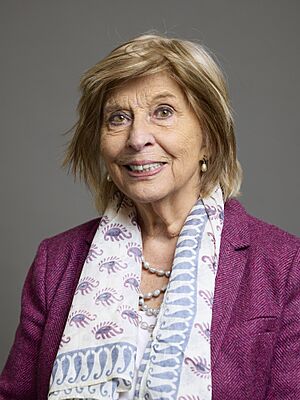Frances D'Souza, Baroness D'Souza facts for kids
Quick facts for kids
The Baroness D'Souza
|
|
|---|---|

Official portrait, 2024
|
|
| Lord Speaker | |
| In office 1 September 2011 – 31 August 2016 |
|
| Monarch | Elizabeth II |
| Deputy |
|
| Preceded by | The Baroness Hayman |
| Succeeded by | The Lord Fowler |
| Convenor of the Crossbench Peers | |
| In office 6 November 2007 – 31 August 2011 |
|
| Preceded by | The Lord Williamson of Horton |
| Succeeded by | The Lord Laming |
| Member of the House of Lords Lord Temporal |
|
| Assumed office 15 September 2004 Life peerage |
|
| Personal details | |
| Born |
Frances Gertrude Claire Russell
18 April 1944 Sussex, England |
| Political party | Crossbench |
| Other political affiliations |
None (as Lord Speaker; 2011–2016) |
| Spouses |
Stanislaus D'Souza
(m. 1959; div. 1974)
(m. 2003; died 2011)Martin Griffiths
(m. 1985; div. 1994) |
| Children | 2 (including Christa) |
| Alma mater | University College London Lady Margaret Hall, Oxford |
| Committees | Procedure Committee (2005–present) House (2007–present) Selection; Privileges; Liaison; Administration and Works (2007–2011) |
Frances Gertrude Claire D'Souza, Baroness D'Souza (born 18 April 1944) is a British scientist and politician. She is also known as Baroness D'Souza. She served as the Lord Speaker from September 2011 to August 2016. The Lord Speaker is the person who chairs meetings in the House of Lords, which is part of the UK Parliament.
Contents
Early Life and Education
Frances Gertrude Claire Russell was born in Sussex, England. Her parents were Robert Anthony Gilbert and Pauline Russell. She went to St Mary's School in Princethorpe.
After school, she studied anthropology at University College London. She earned her first degree in 1970. Later, she continued her studies at Lady Margaret Hall, Oxford, where she received her PhD in 1976.
Early Career and Human Rights
Baroness D'Souza worked in research for several years. From 1973 to 1977, she was at the Nuffield Institute of Brain Chemistry and Human Nutrition. She also worked at Oxford Polytechnic (now Oxford Brookes University) from 1977 to 1980.
From 1985 to 1988, she was an independent research consultant for the United Nations. The United Nations is an international organization that works for peace and cooperation around the world.
A big part of her career was in human rights. From 1989 to 2002, she was the director of Article 19. This organization works to protect freedom of expression and information. As part of her work, she supported a peace initiative called the Musa Anter peace train. This train aimed to promote peace in the Kurdistan region.
Personal Life
Frances D'Souza married Stanislaus Joseph D'Souza in 1959 when she was 15. They had two daughters and later divorced in 1974. One of their daughters is the journalist Christa D'Souza.
She was married to Martin Griffiths from 1985 to 1994. She remarried Stanislaus D'Souza in 2003, and they remained married until his death in 2011.
Honours and Awards
In 1999, Baroness D'Souza was recognized for her work in human rights. She was made a Companion of the Order of St Michael and St George (CMG). This is an honour given by the British monarch for services to the country.
Role in the House of Lords
On 1 July 2004, Frances D'Souza became a life peer. This means she was given the title of Baroness D'Souza and a seat in the House of Lords for her lifetime. The House of Lords is the second chamber of the UK Parliament.
She sat as a crossbencher. Crossbenchers are members of the House of Lords who do not belong to any political party. From 2007 to 2011, she was the Convenor of the Crossbench Peers. This role meant she was the leader of the crossbench members. She was known for attending meetings very regularly.
On 13 July 2011, Baroness D'Souza was elected as the Lord Speaker of the House of Lords. She started this important role in September 2011. As Lord Speaker, she was responsible for keeping order during debates and representing the House of Lords.
Her term as Lord Speaker ended on 31 August 2016. After this, she returned to being a crossbencher. She spoke about the need to manage the size of the House of Lords. She suggested that the Prime Minister's power to appoint new members should be limited.
Expenses as Lord Speaker
In December 2015, information about some of Baroness D'Souza's expenses as Lord Speaker became public. These details were released through a Freedom of Information request.
The information showed that she spent money on official travel and office supplies. For example, she spent £230 to have a chauffeured car wait while she attended a performance. She also spent £270 for a car to wait while she had lunch with the Japanese ambassador. A 10-day official trip to Japan, Hong Kong, and Taiwan cost nearly £26,000. Over five years, she spent £4,000 on fresh flowers for her office. These expenses were paid for by taxpayers.
See also
 In Spanish: Frances D'Souza para niños
In Spanish: Frances D'Souza para niños

